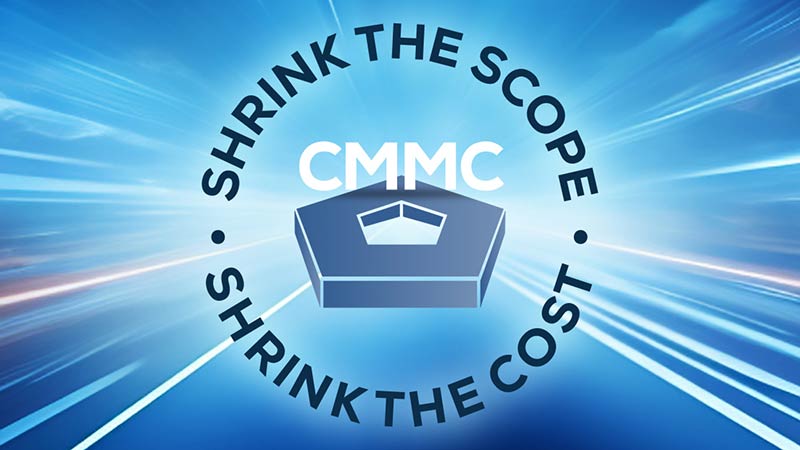Understanding Compliance as a Service (CaaS) and Its Importance for MSPs
Compliance means that a business abides by the rules, laws, regulations, and ethical conduct standards that apply to its organization. Following the rules sounds simple, but achieving compliance is a huge undertaking. It involves everything from policy and procedure development to continuous monitoring of information systems.
Compliance as a Service (CaaS) is a growing industry that allows businesses to outsource the complexities of compliance to third-party providers — and MSPs are uniquely positioned to fill that need. Before we tell you why, let’s explore what’s involved in CaaS in more detail.
What is CaaS?
CaaS enables organizations to meet regulatory mandates without any of the headaches that compliance can bring. CaaS providers typically provide the following as part of this service.
Compliance management tools
It’s difficult to achieve compliance through manual processes, which is why many CaaS providers use specialized software that streamlines and simplifies compliance management. Using these platforms, they can assess internal processes, integrate control functions, keep track of compliance activities, implement responsibility structures, and make updates and revisions as needed.
Expert guidance on navigating regulations
Compliance requirements are complicated. Take NIST SP 800-53, for example. Designed to help businesses strengthen risk management processes, it contains more than 1,000 security controls! Assessing a system, implementing controls, testing those controls, and keeping them updated can be overwhelming for any business. CaaS providers specialize in interpreting and implementing regulatory frameworks, expertly guiding their clients through the process.
Risk assessments and gap analysis
Risk assessment and gap analyses are fundamental components of compliance. Risk assessments involve identifying and controlling potential threats to compliance, whereas gap analysis targets discrepancies between regulatory requirements and an organization’s current state of compliance. A CaaS provider performs regular assessments and audits of an organization’s systems, processes, and data and supplies solutions when improvements are needed.
Policy development and implementation.
The most impactful compliance strategies are those that are adopted across an entire organization, and the best way to do that is through policies that guide day-to-day behavior. CaaS providers help their clients develop, implement, and manage policies that are aligned with regulatory requirements. Employing policy management tools and expertise, they’re able to overcome typical challenges around unstructured policy development, maintaining and tracking policy versions and updates, policy communication and attestation, and training.
Ongoing monitoring and reporting.
Compliance isn’t a one-time thing. Considering how quickly regulatory requirements change, and the pace at which threats evolve, avoiding the consequences of noncompliance is an ongoing effort. After a CaaS provider gets a framework in place, they proactively monitor all the activities involved in that framework to ensure continued compliance. They perform regular quality assurance tests, and generate reports, insights, and solutions where an organization is falling short.
Benefits of CaaS
CaaS has bigger selling points than simplifying the compliance process. It offers cost savings, conserves resources, and significantly reduces the risks associated with noncompliance. Let’s look at all the ways you can market CaaS to clients.
Reduced costs associated with compliance efforts
It takes regular assessments, continuous monitoring, and lightning-quick responsiveness to maintain compliance. Simply put, compliance is a full-time job. But having an in-house compliance team can be costly. There’s the cost of paying that team, of course, but there are also regulatory reporting costs, costs for the systems required to maintain compliance, and an increase in costs every time an organization enters a new market. CaaS is an outsourcing solution that reduces the administrative overhead of compliance management.
Free up resources to focus on core business activities
Compliance requires control implementation, adoption across an organization, regular assessment of systems, and updating as regulations change. In a busy operational environment, that’s a tall order, and small and midsize businesses typically don’t have the internal capabilities to fill it. CaaS hands the complexities of compliance management to the experts, relieving organizations of regulatory pressure and allowing them to stay focused on their business goals.
Reduce various risks associated with noncompliance
In some industries, compliance is a legal obligation, and noncompliance means fines and penalties. For example, HIPAA violations due to willful neglect that are not corrected within 30 days of discovery can carry a penalty as high as $63,973 per violation. Not to mention the costs associated with reputational harm, operational disruption, financial losses, remediation, and loss of talent. CaaS ensures that organizations are up-to-date with their legal and technical compliance requirements, reducing the risk of noncompliance and its potentially devastating costs.
Mitigate security risks
While we’re on the topic of risk, let’s talk about one of the most pressing dangers in today’s business environment: cybercriminals. Organizations store and process a lot of client information, and the security and privacy of that information is a central component of an increasing number of regulatory frameworks and jurisdictional laws. Protecting against security breaches is also just good business because it fosters trust with clients. CaaS providers regularly assess system weaknesses, establish procedures and controls to close those gaps, and monitor data sources in real time for potential threats.
Compliance as a Service for MSPs
Organizations trust their MSPs with all things information and technology. Compliance falls within that sphere of expertise and presents a business opportunity that can’t be understated. Here’s why:
# 1 There’s a growing demand for compliance services.
Compliance used to be a thing that only highly regulated industries had to think about, but that’s not the case these days. More and more organizations find themselves obligated to achieve regulatory and/or legal compliance. For example:
- Payment Card Industry Data Security Standard (PCI DSS): Any company that handles credit card information and manages cardholder data must comply with PCI DSS.
- Cybersecurity Maturity Model Certification (CMMC): Organizations within the Department of Defense (DoD) supply chain, including contractors and subcontractors, are required to obtain a CMMC.
- California Consumer Privacy Act (CCPA): A significant number of for-profit businesses operating in California, such as those that buy, sell or share the personal information of 100,000 or more California residents, are expected to abide by the CCPA.
- Federal Trade Commission (FTC) Safeguards Rule: Financial institutions that handle customer information are subject to the FTC Safeguards Rule, which requires them to implement a comprehensive information security program to protect customer data.
The number of organizations falling under a legal or regulatory framework is growing, and so is the demand for compliance services. In fact, the compliance service industry is expected to grow from 5.51 billion USD in 2022 to more than 19 billion by 2030. MSPs who position themselves as CaaS providers may find new business opportunities in both existing clientele and an increasing number of potential clients.
#2 MSPs can expand their service offerings and attract new clients.
Many small and mid-sized businesses simply don’t have the resources to self-manage the increasing number of regulatory and legal requirements they fall under. But noncompliance is not an option.
MSPs (and MSSPs) are already the tech experts for their clients. They know their client’s systems inside and out, they manage their data, they know their vulnerabilities, and they provide cloud and security solutions. Suffice it to say, MSPs are perfectly positioned to build on existing client relationships by offering CaaS. And, as they build a reputation as trusted CaaS providers, they can increase their brand awareness, potentially attracting new clients from an ever-expanding pool.
#3 CaaS allows MSPs to offer a comprehensive security solution to clients.
Cybersecurity goes hand in hand with compliance. Robust security protocols and monitoring keep valuable data assets safe and reduce the risk of security incidents. These types of security procedures are at the very heart of many regulatory frameworks.
MSPs are specialists in security technologies like firewalls, intrusion detection systems, web-browser security, and encryption protocols. They can leverage that expertise to provide clients with an evaluation of their security posture, making recommendations and improvements that align with regulatory frameworks and laws, and then monitoring and managing that program for them.
CaaS and Compliance Scorecard
There’s a lot involved in compliance management, even more so when you’re managing it for multiple customers. Compliance Scorecard is a compliance management platform designed to help MSPs streamline the process and shine as a CaaS provider:
Perform Assessments
Step one in any compliance strategy is assessing your client’s current compliance and security postures — and we have a range of Scorecards to help you get the job done. Assess and categorize compliance-related risks using the Risk Matrix Scorecard and get insights into their current compliance status with the Assessment Scorecard.
Choose an Appropriate Framework
Compliance Scorecard is loaded with policy packs for various regulatory frameworks, including HIPAA, NIST, CMMC, and others. Within them, you’ll find all the documentation you need to develop appropriate policies and procedures, as well as customization tools for tailoring a compliance program to your client’s specific needs.
Provide Continuous Compliance
Once you have a framework implemented, it needs to be monitored, assessed, and updated – and Compliance Scorecard facilitates it all. It’s equipped with detailed reporting and auditing capabilities that help you keep your clients consistently compliant.
The Fast Track to Becoming a CaaS Provider
Compliance is no longer limited to heavily regulated industries. An increasing number of organizations are looking for help with the implementation and management of their compliance programs, and they’re finding help from CaaS providers.
CaaS is a growing industry that has a lot of potential for MSPs looking to expand their services and reach new clients. Getting started may seem daunting, but Compliance Scorecard helps you become a compliance superstar.
Join us for a free live demo
Read More
Why the CMMC Update Presents a Business Opportunity for MSPs
Why MSPs Should Offer Governance as a Service
The Quick Guide to GRC for MSSPs



